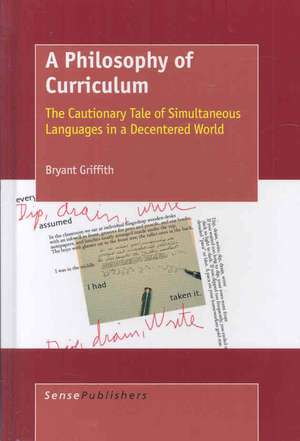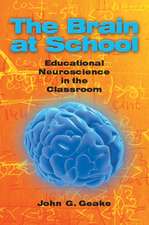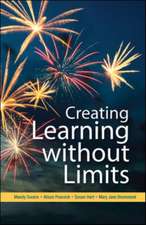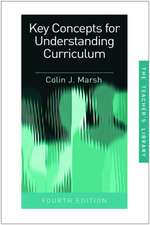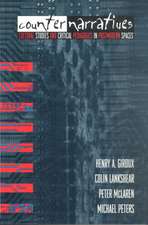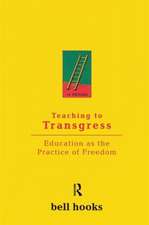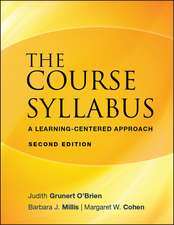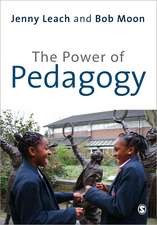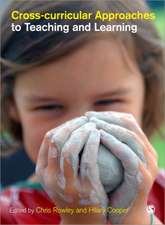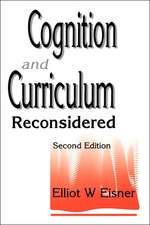A Philosophy of Curriculum
Autor Bryant Griffithen Limba Engleză Hardback – 16 oct 2007
| Toate formatele și edițiile | Preț | Express |
|---|---|---|
| Paperback (1) | 257.87 lei 38-44 zile | |
| Brill – 31 dec 2006 | 257.87 lei 38-44 zile | |
| Hardback (1) | 775.71 lei 38-44 zile | |
| Sense Publishers – 16 oct 2007 | 775.71 lei 38-44 zile |
Preț: 775.71 lei
Preț vechi: 1007.41 lei
-23% Nou
Puncte Express: 1164
Preț estimativ în valută:
148.45€ • 154.10$ • 123.78£
148.45€ • 154.10$ • 123.78£
Carte tipărită la comandă
Livrare economică 18-24 martie
Preluare comenzi: 021 569.72.76
Specificații
ISBN-13: 9789087900885
ISBN-10: 9087900880
Pagini: 132
Dimensiuni: 156 x 234 x 10 mm
Greutate: 0.36 kg
Editura: Sense Publishers
ISBN-10: 9087900880
Pagini: 132
Dimensiuni: 156 x 234 x 10 mm
Greutate: 0.36 kg
Editura: Sense Publishers
Descriere
Descriere de la o altă ediție sau format:
Curriculum has become the new wonder word for our times. Even more, curriculum has become a concept, and an idea. This book provides a speculum mentis, a map of the mind, of modern curriculum theory to help trace the interactions between various forms of thought as they play out in contemporary schooling. This book is also about how the weaving of various forms of thought provides an umbrella of understanding about the nature of curriculum and perhaps a glimpse of human understanding.
One of the presuppositions of this book is that there are often, and perhaps almost always, multiple strands of ideas at work simultaneously. In the modern world when they come together they form a coherent set of theories which can be called a paradigm. In the de-centered world that this book suggests the history of ideas then might be best described as being a bit like our own mind. We often have divergent opinions about who we are, what we want to do and so on. One of the central concepts in contemporary education, reflection, is an attempt to help us override that tendency, to become more pragmatic by focusing and getting on with the job. This might work in the world of formal education where one can coerce students to be more goal oriented for short periods of time by testing them, but in reality that doesn’t happen to most of us a lot of the time.
To illustrate this point strands such as the development of theoretical physics in the early part of the twentieth century, a discussion of the part which philosophical thinking plays in the development of curriculum, particularly in a post modern sense, a recasting of narrative knowledge and a focus on mavericks learners, are discussed.
To live in this modern- post modern world requires reflective thought about the question of what form connectedness will take. In this case the small narratives of the thinkers who have experienced the tension between the modern and post modern world as they variously grappled with their inabilities to construct a unified theory are examined. It is suggested that this failure is a primary illustration of the grand narratives initial collapse. Further, it is suggested that the smaller stories of men and women working to paper over the cracks in the proceeding decades represent the foundations of a metaphor for the human condition as it in fact is not as it has been constructed.
Bryant Griffith is currently a Professor in the College of Education at Texas A&M University - Corpus Christi. He has also been on the faculty of the University of Calgary in Canada and has taught in various public school settings. Dr Griffith has published widely in the areas of curriculum theory and the philosophy of education.
Curriculum has become the new wonder word for our times. Even more, curriculum has become a concept, and an idea. This book provides a speculum mentis, a map of the mind, of modern curriculum theory to help trace the interactions between various forms of thought as they play out in contemporary schooling. This book is also about how the weaving of various forms of thought provides an umbrella of understanding about the nature of curriculum and perhaps a glimpse of human understanding.
One of the presuppositions of this book is that there are often, and perhaps almost always, multiple strands of ideas at work simultaneously. In the modern world when they come together they form a coherent set of theories which can be called a paradigm. In the de-centered world that this book suggests the history of ideas then might be best described as being a bit like our own mind. We often have divergent opinions about who we are, what we want to do and so on. One of the central concepts in contemporary education, reflection, is an attempt to help us override that tendency, to become more pragmatic by focusing and getting on with the job. This might work in the world of formal education where one can coerce students to be more goal oriented for short periods of time by testing them, but in reality that doesn’t happen to most of us a lot of the time.
To illustrate this point strands such as the development of theoretical physics in the early part of the twentieth century, a discussion of the part which philosophical thinking plays in the development of curriculum, particularly in a post modern sense, a recasting of narrative knowledge and a focus on mavericks learners, are discussed.
To live in this modern- post modern world requires reflective thought about the question of what form connectedness will take. In this case the small narratives of the thinkers who have experienced the tension between the modern and post modern world as they variously grappled with their inabilities to construct a unified theory are examined. It is suggested that this failure is a primary illustration of the grand narratives initial collapse. Further, it is suggested that the smaller stories of men and women working to paper over the cracks in the proceeding decades represent the foundations of a metaphor for the human condition as it in fact is not as it has been constructed.
Bryant Griffith is currently a Professor in the College of Education at Texas A&M University - Corpus Christi. He has also been on the faculty of the University of Calgary in Canada and has taught in various public school settings. Dr Griffith has published widely in the areas of curriculum theory and the philosophy of education.
